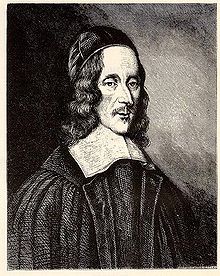George Herbert | |
|---|---|
 Portrait by Robert White, 1674 (National Portrait Gallery) | |
| Born | 3 April 1593 Montgomery, Montgomeryshire, Wales |
| Died | 1 March 1633 (aged 39) Bemerton, Wiltshire, England |
| Occupation |
|
| Alma mater | Trinity College, Cambridge |
| Literary movement | Metaphysical poetry |
| Notable works |
|
George Herbert (3 April 1593 – 1 March 1633)[1] was an English poet, orator, and priest of the Church of England. His poetry is associated with the writings of the metaphysical poets, and he is recognised as "one of the foremost British devotional lyricists."[2] He was born in Wales into an artistic and wealthy family and largely raised in England. He received a good education that led to his admission to Trinity College, Cambridge, in 1609. He went there with the intention of becoming a priest, but he became the University's Public Orator and attracted the attention of King James I. He sat in the Parliament of England in 1624 and briefly in 1625.[3]
After the death of King James, Herbert renewed his interest in ordination. He gave up his secular ambitions in his mid-thirties and took holy orders in the Church of England, spending the rest of his life as the rector of the rural parish of Fugglestone St Peter, just outside Salisbury. He was noted for unfailing care for his parishioners, bringing the sacraments to them when they were ill and providing food and clothing for those in need. Henry Vaughan called him "a most glorious saint and seer".[4] He was never a healthy man and died of consumption at age 39.
- ^ Wilcox 2004.
- ^ Cite error: The named reference
HerbertBioPoetryFDNwas invoked but never defined (see the help page). - ^ Charles 1977, p. 104.
- ^ Vaughan 1652, p. 119.